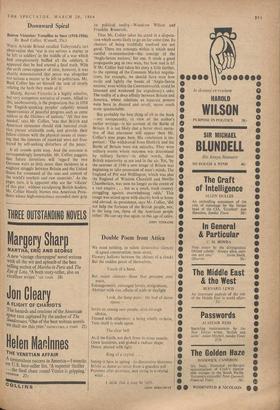Downward Spiral
WHEN Aristide Briand recalled Talleyrand's tart observation that 'war is too serious a matter to be left to soldiers' in the middle of a war which had conspicuously baffled all the soldiers, it appeared that he had uttered a final truth. With the swift come-uppance of time, however, it was shortly demonstrated that peace was altogether too serious a matter to be left to politicians. Mr. Basil Collier has set himself the task of tersely relating the hash they made of it.
Mainly, Barren Victories is a highly selective, but very competent narrative of events. Allied to this, unobtrusively, is the proposition that in 1918 the 'English-speaking peoples' culpably missed `opportunities of peaceful progress such as come seldom in the lifetimes of nations.' All that was needed,' says Mr. Collier, 'was that British and American statesmen should sink national rival- ries, pursue attainable ends, and provide their fellow-citizens with the physical means of ensur- ing that the interests of mankind were not frus- trated by self-seeking disturbers of the peace.'
It all sounds quite easy. And the outcome is correspondingly lamentable. Mr. Collier suggests that future historians will 'regard the two German wars as little more than incidents in a mightier struggle between Britain and the United States for command of the seas and control of the world's markets and raw materials.' As the pages turn, it is apparent who are the `villains' of this plot : without exculpating British leaders, Mr. Collier bluntly blames two American Presi- dents whose high-mindedness exceeded their grip on political reality—Woodrow Wilson and Franklin Roosevelt.
Thus Mr. Collier takes his stand in a disputa- tion which seems likely to go on for some time. Its chances of being truthfully resolved are not good. There are concepts within it which need careful re-examination--the concept of the 'Anglo-Saxon nations,' for one. It made a good propaganda peg in two wars, but how real is it? If Mr. Collier had taken his story a little further, to the opening of the Common Market negotia- tions, for example, we should have seen how easily and lightly the bonds of 'Anglo-Saxon nations,' even within the Commonwealth, could be loosened and weakened for expediency's sake. The reality of a deep affinity between Britain and America, whose relations as separate powers were born in discord and revolt, seems much more questionable.
But probably the best thing of all in the book —not unexpectedly, in view of the author's earlier writings—is his account of the Battle of Britain. It is not likely that a better short narra- tive of that encounter will appear than Mr. Collier's nine pages here. His conclusion is im- portant: 'The withdrawal from Dunkirk and the Battle of Britain were not miracles. They were military events whose outcome was determined by military factors'—in other words, sheer British superiority at sea and in the air. Yet, `by the summer of 1940 a new image of Britain was beginning to take possession of men's minds. The England of Pitt and Wellington, which was also the England of Winston Churchill and Neville Chamberlain, was seen no longer as the centre of a vast empire . . . but as a small, weak country struggling against overwhelming odds.' This image was seized upon with alacrity both at home and abroad; its persistence, says Mr. Collier, 'did not help the fortunes of the British people, nor, in the long run, those of the American people either.' He can say that again, to this age of satire.
JOHN TERRA INE








































 Previous page
Previous page